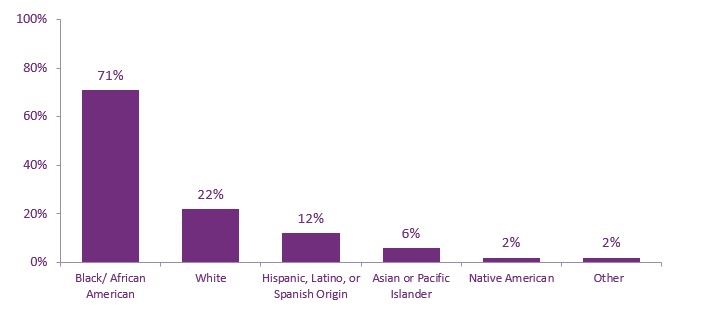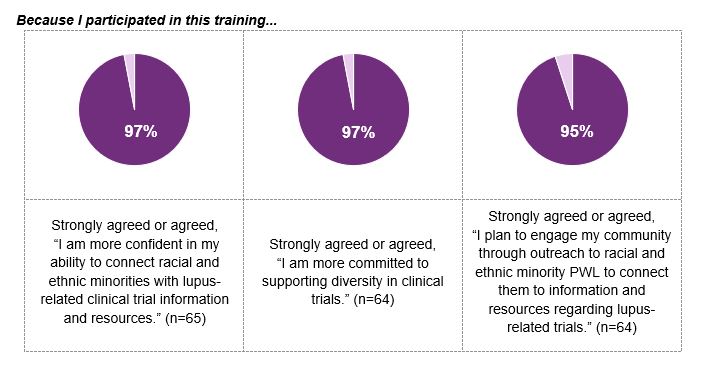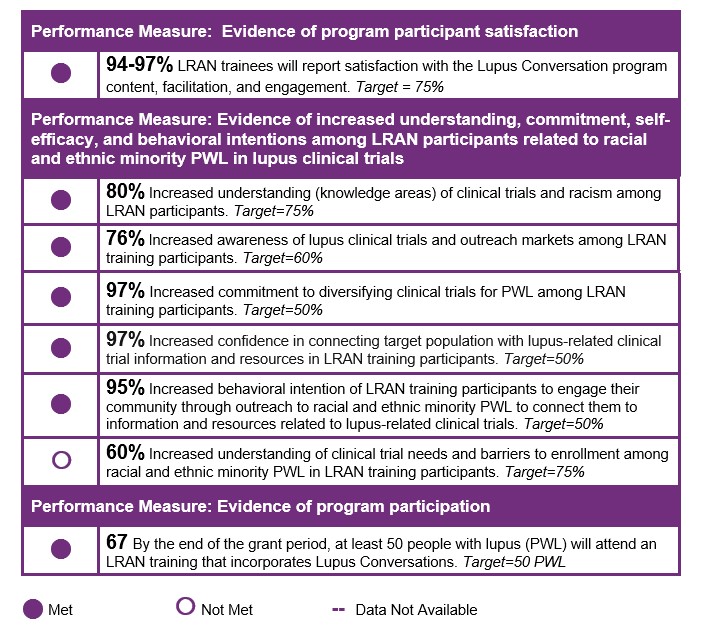Session Information
Session Type: Abstract Session
Session Time: 2:00PM-3:30PM
Background/Purpose: Black/African American people with lupus (PWL) experience greater disease prevalence and severity than White PWL. The need for more racial and ethnic diversity amongst lupus clinical trial (CT) participants is needed as there continues to be a high level of unmet medical need within this population. Lack of trust has been found to negatively influence Black/African American participation in CT that contributes to higher perceptions of bias and racism among this population. Peer-to-peer models such as CDC’s Popular Opinion Leader (POL) has been shown to be effective in building trust and confidence within the community while empowering PWL to take leadership roles in communicating the importance of diversifying CT participation.
Methods: The Lupus Conversations Program, an evidence-based curriculum based on the POL model, aims to improve the awareness of lupus CT, increase knowledge of the CT process as well as addressing barriers, facilitators, and mediators to CT participation such as structural racism in research among Black/African American PWL. This model was adapted and employed through virtual and in-person training sessions for Lupus Research Action Network (LRAN) members with goals of increasing knowledge, confidence, and intent to engage in peer-to-peer outreach opportunities to discuss the importance of participation in lupus CT among Black/African American PWL. A retrospective pre-post survey was developed to assess participant demographics and increases in CT knowledge and awareness of trials, self-efficacy, and confidence to share CT information with peers, and examine training satisfaction.
Results: LRAN members participated in one of two trainings in September 2022 (n=40) and April 2023 (n= 27). Almost all LRAN survey respondents identified as female. The average age of participants was 42 (n=63). Over two-thirds of the training participants identified as Black/African American. Almost a quarter identified as White, 12% as Hispanic, Latino or Spanish origin, 6% as Asian or Pacific Islander, and 2% as Native American. LRAN members resided in 12 states. Over 90% of LRAN members reported satisfaction with LRAN training content, facilitation, and engagement. Sixty percent reported an increased understanding of CT needs and barriers to enrollment among racial and ethnic minority PWL. Eight out of ten increased their understanding of CT and racism and increased their awareness of lupus CT and outreach markets. Nearly all participants increased their commitment to diversifying CT participation for PWL, confidence in connecting target population with lupus CT information and resources, and behavioral intention to engage their community through outreach to racial and ethnic minority PWL to connect them to information and resources related to lupus CT.
Conclusion: An adapted, community-based POL model can be used to increase awareness of and commitment to diversifying participation in lupus CT among Black/African American PWL. Further research is needed to determine the degree to which a peer-to-peer education module may reduce disparities in CT participation among Black/African American PWL. Existing level of CT knowledge must be considered when developing patient-centered content.
To cite this abstract in AMA style:
Miller M, Slan S, Ramsey-Goldman R, Sneed R, Feldman C, Wildman P, Justin T, Oberholtzer L, Buie J. Lupus Research Action Network: Increasing Minority Clinical Trial Participation Through Peer Leaders [abstract]. Arthritis Rheumatol. 2023; 75 (suppl 9). https://acrabstracts.org/abstract/lupus-research-action-network-increasing-minority-clinical-trial-participation-through-peer-leaders/. Accessed .« Back to ACR Convergence 2023
ACR Meeting Abstracts - https://acrabstracts.org/abstract/lupus-research-action-network-increasing-minority-clinical-trial-participation-through-peer-leaders/



